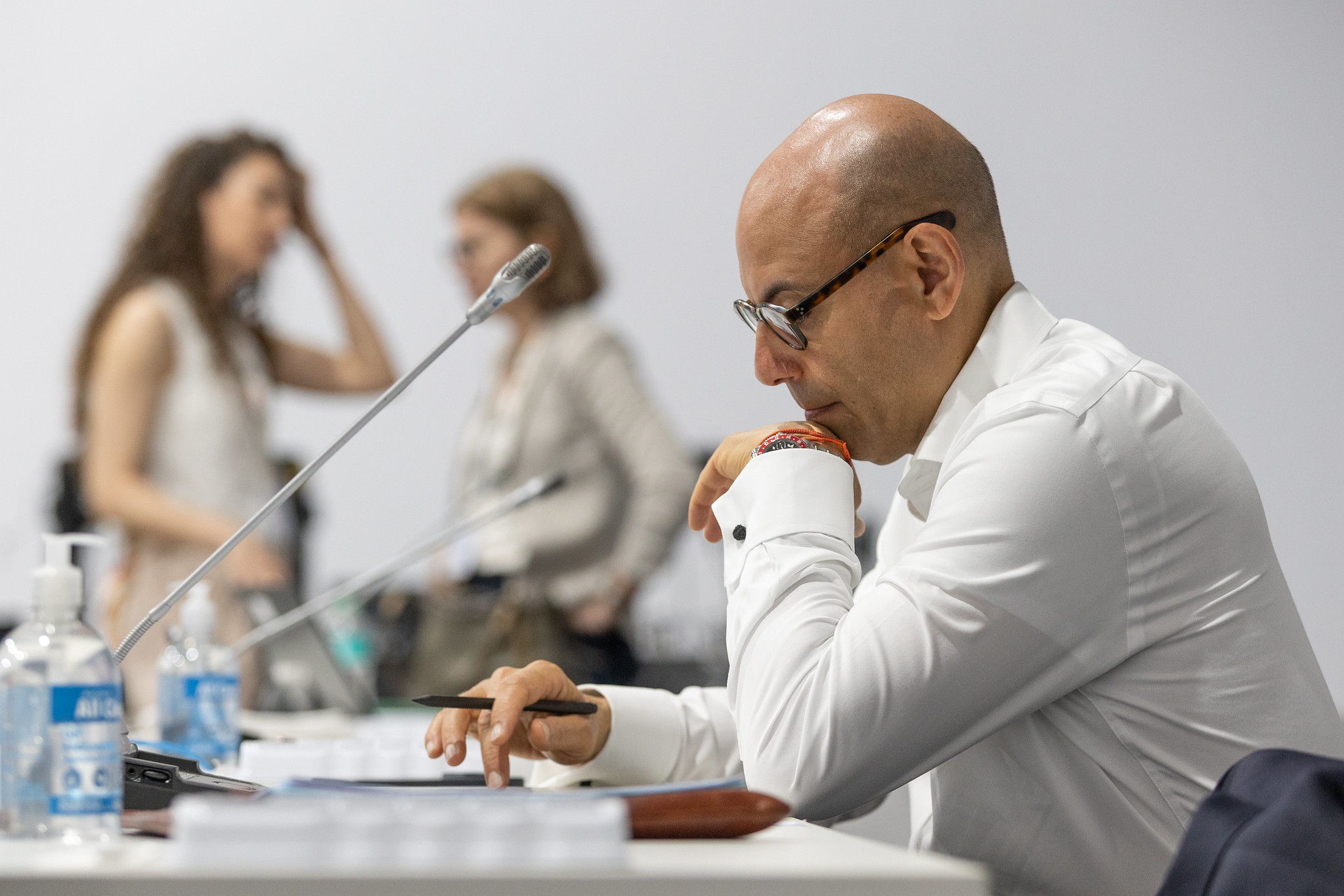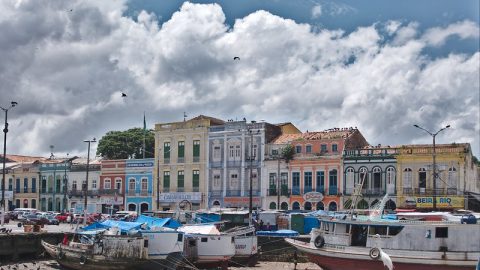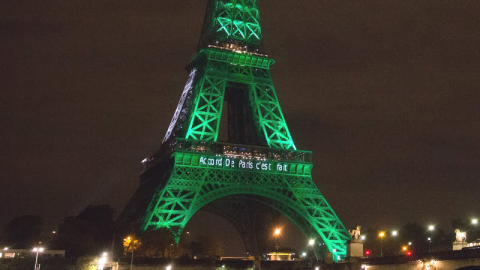In his final letter published on the eve of COP30’s opening day on Monday, the summit’s Brazilian boss André Aranha Corrêa do Lago spelled out his top priority: ensure that the nearly 200 disparate country delegations gathering in Belèm “evolve into one cohesive team”.
But his hopes of channelling global togetherness look set to get a reality check. A familiar battle is brewing over the conference’s agenda for the coming two weeks, after negotiating groups tabled six proposals for additional topics to be discussed.
Emerging economies ask for talks on finance and trade
Two come from the Like-Minded Group of Developing Countries (LMDCs), which includes China, India and Saudi Arabia, with support from the Arab Group of predominantly oil-rich nations and cover well-trodden territory: finance and trade.
On finance, the bloc wants dedicated discussions on Article 9.1 of the Paris Agreement, which sets out an obligation for developed countries to provide financial help for developing nations’ efforts to cut emissions and adapt to a warming world.
Their demand that rich governments stump up cash is nothing new. But that has now been fuelled further by disappointment over the outcome of last year’s negotiations which produced the new UN climate finance goal of $300 billion a year by 2035. The LMDCs are now calling for a three-year “work programme” to discuss how the provision of money from developed nations under Article 9.1 is crucial to reach a broad range of goals in the Paris accord.
The bloc also wants the summit to tackle “unilateral trade-restrictive measures”. That is code for mechanisms such as the EU’s carbon border adjustment mechanism (CBAM), which is essentially a carbon tax on imports aimed at creating a level-playing field between domestic and overseas producers.
But emerging economies – such as China and India – say those measures are protectionist, do not take different levels of development into account, and would harm their economies. They have been calling for the inclusion of this agenda item at the previous two COPs – but so far have not succeeded in their bid to separate the topic out from existing discussions.
Since taking on the presidency, Brazil has been trying to defuse a likely COP30 agenda fight over trade measures. But Do Lago’s proposal to create a new forum to discuss climate and trade outside of the UN climate regime was met with a lukewarm response.
Small islands push ‘survival’ agenda
Hot on the heels of UN chief Antonio Guterres conceding that a breach of the 1.5C warming limit is “inevitable”, the Alliance of Small Island States (AOSIS) has put forward a proposal for discussions on how to react to that and raise emission-cutting ambition.
The group, predominantly composed of low-lying Pacific island nations, wants to create a dedicated space to agree “on concrete follow-up actions” to accelerate implementation of efforts before 2030. This also feeds into existing divisions over how COP30 should respond to a wide shortfall in ambition in countries’ updated national climate plans (NDCs) submitted this year.
“We are proposing this agenda item because the world’s current trajectory toward climate catastrophe is unacceptable – morally, scientifically, and legally,” said AOSIS Chair Ambassador Ilana Seid. “For small island nations, this is not about negotiation tactics – it’s about survival.”
The EU, for its part, wants dedicated discussions over a transparency mechanism of the Paris Agreement that requires countries to report a vast amount of national-level information, including inventories of greenhouse gas emissions and measures taken to act on promises made in their NDCs.
In its submission, the EU says it is “crucial” that good practices are shared and that barriers to boosting climate action are identified and urgently fixed.


Forests, mountains and health
Forest nations Honduras, Suriname and Papua New Guinea, meanwhile, are calling for discussions on the need for an “urgent” increase in financial support for global efforts “to reverse global deforestation and degradation by 2030” – one of the key agreements made at COP28 in Dubai two years ago.
Two additional proposals came in at the last minute on Sunday from Zimbabwe and Kyrgyzstan, respectively.
The Southeast African nation wants to create a new space for discussions on the impact of climate change on health. Its submission calls for a “structured dialogue” between negotiators and health experts that could come up with concrete actions to advance health considerations in adaptation interventions and meet the needs of the most vulnerable communities.
The Central Asian country wants better integration of mountain-related issues into the global climate agenda and, more specifically, the creation of an Annual Expert Dialogue on Mountains and Climate Change.
In an attempt to enable the smooth adoption of the conference agenda and prevent fireworks at the opening session, the COP30 presidency met with heads of government delegations on Sunday. The plenary will show whether those efforts to accommodate new agenda demands have been successful.
UN climate chief: Fight the climate crisis not each other
The head of the UN’s climate body kicked off the summit with a reminder to governments that “your job here is not to fight one another – your job is to fight this climate crisis, together”.
How far that advice is taken on board will be evident from day one, as a fight loomed over several new agenda items put forward by countries in the run-up to the conference
Simon Stiell told the assembled delegates he wasn’t “sugar-coating” the challenge ahead. “We have so much more work to do,” he said in his opening speech. “We must move much, much, faster on both reductions of emissions and strengthening resilience,” he added.


While the Paris Agreement, adopted 10 years ago, has started to bend the emissions curve downwards, it will not be enough to meet the lowest 1.5C warming limit in the accord, the UN has admitted in recent days based on new national climate plans (NDCs) submitted for the next 10 years.
“We can and must bring temperatures back down to 1.5C after any temporary overshoot,” Stiell said. For that to happen, countries need to make decisions in Belem to move forward on things they have already agreed, he emphasised.
For example, at COP28 in Dubai two years ago, governments pledged to transition away from fossil fuels in energy systems. “Now’s the time to focus on how we do it fairly and orderly,” said Stiell. “Focusing on which deals to strike, to accelerate the tripling of renewables and doubling energy efficiency.”
Other agreed areas for action at COP30 that need “strong and clear outcomes” include a roadmap to raise climate finance to $1.3 trillion a year by 2035, a set of indicators to measure progress on the Global Goal of Adaptation, a technology implementation programme and just transition pathways for economies and societies, he added.
World leaders get behind climate action at first COP in the Amazon
Stiell did not mince his words about the ramifications if the talks do not spur greater climate action in the real world. He told delegates that squabbling while famines, extreme weather and conflicts ruin the lives of millions would never be forgotten or forgiven.
“We don’t need to wait for late NDCs to slowly trickle in, to spot the gap and design the innovations necessary to tackle it,” he said, emphasising that the solutions already exist. “Not one single nation among you can afford this, as climate disasters rip double-digits off GDP,” he warned.
While noting that the Paris Agreement “is working to deliver real progress”, Stiell ended by calling on the assembled negotiators to “strive valiantly for more”.
The post COP30 Bulletin Day 1: Agenda fight looms over opening day appeared first on Climate Home News.
Climate Change
Five Years Into a Fishing Ban, the Yangtze River Is Teeming With Life
A doubling of fish biomass along Asia’s longest river shows hope for large-scale conservation efforts and a lifeline for the endangered finless porpoise.
Flowing almost 4,000 miles from the Tibetan Plateau to the East China Sea, the Yangtze is China’s “Mother River.” From the emerald-green rice paddies of Hunan to the industrial hubs of Wuhan and Shanghai, the river basin generates 40 percent of the nation’s economic output. Yet, 70 years of rapid development had, until recently, wreaked havoc on its delicate marine ecosystem.
Five Years Into a Fishing Ban, the Yangtze River Is Teeming With Life
Climate Change
‘We Will See Them in Court’: Environmental Lawyers Vow to Challenge Trump’s Repeal of Key Climate Finding
The Trump administration repealed the EPA’s 2009 determination that greenhouse gases are a pollutant, an important legal foundation for their regulation.
The Trump administration moved today to overturn a key legal foundation of the federal government’s authority to regulate greenhouse gases. In a press conference at the White House, President Donald Trump hailed the move as “the single largest deregulatory action in American history.”
Climate Change
Trump Says He Supports American Oil and Gas. Why Is His Administration Financing a French-Owned Project in Mozambique?
The gas export terminal would be one of Africa’s largest fossil fuel projects, in an area with an ongoing Islamist insurgency. The project has been plagued by delays and accusations of human rights violations.
In the conflict-riven northern corner of Mozambique, a huge gas export terminal is moving ahead with the backing of the United States government.
-
Climate Change6 months ago
Guest post: Why China is still building new coal – and when it might stop
-
Greenhouse Gases6 months ago
Guest post: Why China is still building new coal – and when it might stop
-
Climate Change2 years ago
Bill Discounting Climate Change in Florida’s Energy Policy Awaits DeSantis’ Approval
-

 Greenhouse Gases2 years ago
Greenhouse Gases2 years ago嘉宾来稿:满足中国增长的用电需求 光伏加储能“比新建煤电更实惠”
-
Climate Change2 years ago
Spanish-language misinformation on renewable energy spreads online, report shows
-

 Climate Change2 years ago
Climate Change2 years ago嘉宾来稿:满足中国增长的用电需求 光伏加储能“比新建煤电更实惠”
-
Climate Change Videos2 years ago
The toxic gas flares fuelling Nigeria’s climate change – BBC News
-

 Carbon Footprint2 years ago
Carbon Footprint2 years agoUS SEC’s Climate Disclosure Rules Spur Renewed Interest in Carbon Credits





